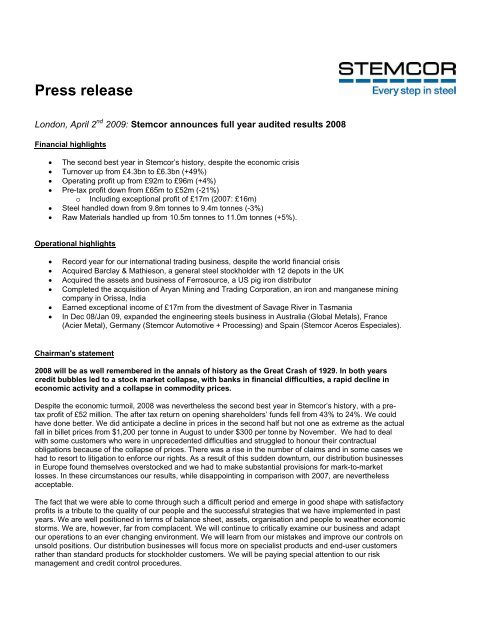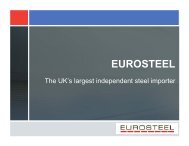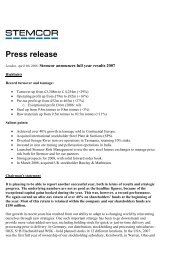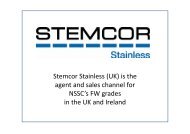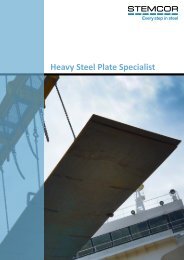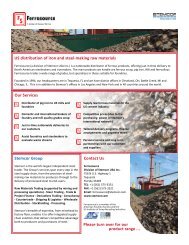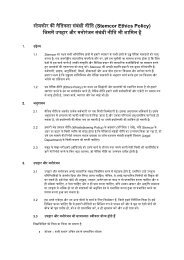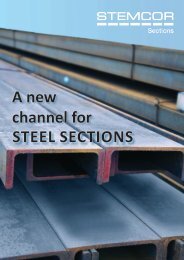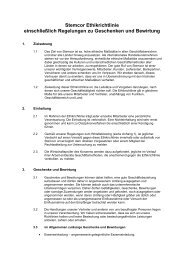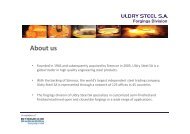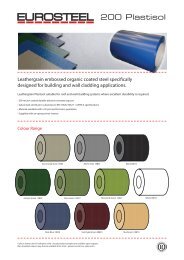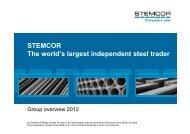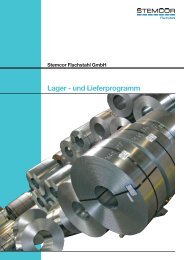Create successful ePaper yourself
Turn your PDF publications into a flip-book with our unique Google optimized e-Paper software.
<strong>Press</strong> <strong>release</strong><br />
London, April 2 nd 2009: <strong>Stemcor</strong> announces full year audited results 2008<br />
Financial highlights<br />
• The second best year in <strong>Stemcor</strong>’s history, despite the economic crisis<br />
• Turnover up from £4.3bn to £6.3bn (+49%)<br />
• Operating profit up from £92m to £96m (+4%)<br />
• Pre-tax profit down from £65m to £52m (-21%)<br />
o Including exceptional profit of £17m (2007: £16m)<br />
• Steel handled down from 9.8m tonnes to 9.4m tonnes (-3%)<br />
• Raw Materials handled up from 10.5m tonnes to 11.0m tonnes (+5%).<br />
Operational highlights<br />
• Record year for our international trading business, despite the world financial crisis<br />
• Acquired Barclay & Mathieson, a general steel stockholder with 12 depots in the UK<br />
• Acquired the assets and business of Ferrosource, a US pig iron distributor<br />
• Completed the acquisition of Aryan Mining and Trading Corporation, an iron and manganese mining<br />
company in Orissa, India<br />
• Earned exceptional income of £17m from the divestment of Savage River in Tasmania<br />
• In Dec 08/Jan 09, expanded the engineering steels business in Australia (Global Metals), France<br />
(Acier Metal), Germany (<strong>Stemcor</strong> Automotive + Processing) and Spain (<strong>Stemcor</strong> Aceros Especiales).<br />
Chairman's statement<br />
2008 will be as well remembered in the annals of history as the Great Crash of 1929. In both years<br />
credit bubbles led to a stock market collapse, with banks in financial difficulties, a rapid decline in<br />
economic activity and a collapse in commodity prices.<br />
Despite the economic turmoil, 2008 was nevertheless the second best year in <strong>Stemcor</strong>’s history, with a pretax<br />
profit of £52 million. The after tax return on opening shareholders’ funds fell from 43% to 24%. We could<br />
have done better. We did anticipate a decline in prices in the second half but not one as extreme as the actual<br />
fall in billet prices from $1,200 per tonne in August to under $300 per tonne by November. We had to deal<br />
with some customers who were in unprecedented difficulties and struggled to honour their contractual<br />
obligations because of the collapse of prices. There was a rise in the number of claims and in some cases we<br />
had to resort to litigation to enforce our rights. As a result of this sudden downturn, our distribution businesses<br />
in Europe found themselves overstocked and we had to make substantial provisions for mark-to-market<br />
losses. In these circumstances our results, while disappointing in comparison with 2007, are nevertheless<br />
acceptable.<br />
The fact that we were able to come through such a difficult period and emerge in good shape with satisfactory<br />
profits is a tribute to the quality of our people and the successful strategies that we have implemented in past<br />
years. We are well positioned in terms of balance sheet, assets, organisation and people to weather economic<br />
storms. We are, however, far from complacent. We will continue to critically examine our business and adapt<br />
our operations to an ever changing environment. We will learn from our mistakes and improve our controls on<br />
unsold positions. Our distribution businesses will focus more on specialist products and end-user customers<br />
rather than standard products for stockholder customers. We will be paying special attention to our risk<br />
management and credit control procedures.
Even though our distribution interests in Europe were hit hard by the recession, we remain committed to this<br />
business. We have recapitalised our German companies to compensate for the losses they made and are<br />
putting into place measures required to ensure future profitability. In the medium term we believe we can<br />
develop a profitable business on the European continent in general and in Germany in particular.<br />
Our international trading businesses, selling into Asia and Africa, had a very good year. This business, which<br />
was and remains our original core business, continues to flourish, in part because of rapid growth in<br />
developing markets. Despite tough conditions, trading so far in 2009 is proving resilient and we are increasing<br />
our market share. In these international trading operations we have made considerable use of the new steel<br />
futures market for billets on the London Metal Exchange. We have recently established an alliance with<br />
Deutsche Bank to promote steel derivatives and offer hedging solutions to the global steel industry. Contracts<br />
will be in the name of Deutsche Bank, but we will be using our worldwide connections to generate business. I<br />
hope in my statement next year to be able to report on a successful beginning for this new venture.<br />
In the last two years we have expanded our stockholding operations, both through acquisition and by the<br />
establishment of new greenfield operations. Some of these operations are ‘virtual’, in the sense that<br />
warehousing and transport are contracted out. Steel stockholding, in any form, is a capital intensive business<br />
and further stockholding acquisitions or start-ups will depend on obtaining additional capital, either in the form<br />
of new equity or longer term debt. A key requirement for the successful growth of our stockholding business is<br />
the development of our own proprietary software to control our operations. We have embarked on this major<br />
task, which should be fully completed by the end of next year.<br />
The focus of our investments in mining operations is now firmly on India. We have had close trading ties with<br />
India for 50 years and are strong believers in the future of this economy. I am pleased to say that the<br />
construction of our pellet plant in Orissa is proceeding well. The plant is being built to the highest standards<br />
and we have assembled a very high quality team to take this project through to completion. It will complement<br />
our mining assets as we now have interests in two producing iron ore mines, also in Orissa. Sales of ore from<br />
these mines already contribute to our profits and the pellet plant will in future add value by upgrading and<br />
processing the fines produced from these mines. Although we expect the international iron ore price to<br />
weaken, we are confident about the future potential of our mining assets because of the high quality of the<br />
deposits, the low extraction costs and the increasing demand for iron ore within India.<br />
We have enlarged our board to fifteen directors with two new appointments. Ron Harvey has been<br />
responsible for the growth of our engineering steels business while Matthew Stock has driven our<br />
developments in India. Given the size of the board we have established smaller committees to improve the<br />
speed and efficiency of our decision making. We are still in the transition from a small family business into a<br />
medium sized global enterprise. Our aim is to emulate the highest standards of business ethics, corporate<br />
governance and transparency expected of larger organisations and, although there is much work to be done,<br />
we are determined to achieve that objective.<br />
<strong>Stemcor</strong> expects to continue the successful growth it has experienced in recent years. Our performance will,<br />
of course, be affected by the general well-being of the world economy. We all hope that the world in general<br />
will benefit from the lessons learned from 1929 and the ensuing depression of the 1930s. I am cautiously<br />
optimistic that there is a reasonable chance that we will see a resumption of growth in the US economy before<br />
the end of this year, with stronger growth throughout the world in 2010. Different commentators come out with<br />
different views and the truth of the matter is that none of us can be certain about future economic<br />
developments. We have survived a difficult year in 2008 with creditable results. In common with the rest of the<br />
steel industry we expect 2009 to be a very tough year but we remain confident about our future.<br />
My thanks again to our customers, our suppliers and our bankers for their continued support, and to our<br />
dedicated staff for all their hard work.<br />
Ralph Oppenheimer<br />
Executive Chairman<br />
1 April 2009<br />
All the financial information set out below is extracted from the audited financial statements of<br />
<strong>Stemcor</strong> Holdings Limited:
Consolidated profit and loss account<br />
For the year ended 31 December 2008<br />
Year to Year to<br />
31/12/2008 31/12/2007<br />
£'m £'m<br />
Turnover 6,288 4,254<br />
Cost of sales (6,072) (4,075)<br />
Gross Profit 216 179<br />
Distribution costs and administrative expenses (120) (87)<br />
Operating profit 96 92<br />
Exceptional Items 17 16<br />
Net interest payable (61) (43)<br />
Profit on ordinary activities before tax 52 65<br />
Taxation (17) (20)<br />
Profit on ordinary activities after tax 35 45<br />
Minority Interests 1 (1)<br />
Profit attributable to shareholders 36 44<br />
Consolidated balance sheet<br />
31 December 2008<br />
31/12/2008 31/12/2007<br />
£'m £'m<br />
Fixed assets 118 40<br />
Current assets<br />
Stocks 730 417<br />
Debtors 1,221 831<br />
Investment 11 -<br />
Cash at bank and in hand 266 169<br />
2,228 1,417<br />
Creditors: amounts falling due within one year<br />
Bank loans and overdrafts (1,338) (848)<br />
Creditors and accruals (578) (408)<br />
(1,916) (1,256)<br />
Net current assets 312 161<br />
Total assets less current liabilities 430 201<br />
Creditors: amounts falling due after more than one<br />
year (185) (51)<br />
Net assets 245 150<br />
Shareholders' funds 234 150<br />
Minority interests 11 -<br />
Total equity 245 150
Editor’s notes<br />
<strong>Stemcor</strong> is the world’s largest independent steel trader.<br />
<strong>Stemcor</strong> plays a pivotal role in the steel industry, acting as a trading intermediary between producers and<br />
purchasers and providing a range of value-adding services. Steel goods traded include a wide range of long,<br />
flat, tube and semi-finished products. Raw materials for the production of steel include iron ore, pig iron, coal,<br />
coke, ferroalloys and scrap.<br />
<strong>Stemcor</strong> now employs approximately 1,400 people in its network of 80 offices in 40 countries across the<br />
globe. For the financial year ending 31 December 2008, <strong>Stemcor</strong> handled 20.4 million tonnes of steel and<br />
associated raw materials, with turnover of £6.3 billion (US$11.7 billion).<br />
<strong>Stemcor</strong>’s services span every step in the steel supply chain, from the provision of steel-making raw materials<br />
to producers through to the delivery of processed steel to end-users. The company’s core competencies –<br />
finance, raw materials, steel trading, distribution and stockholding - are interlinked and apply to all its business<br />
units across the world. <strong>Stemcor</strong>’s breadth of expertise - from minehead to factory floor – enables it to offer<br />
integrated solutions that improve its partners’ business performance.<br />
<strong>Stemcor</strong> does not own any steel mill, nor is any mill a shareholder in the Company. This independence<br />
ensures that it is objective in matching exact customer needs in terms of quality, specifications, financial terms<br />
and delivery.<br />
<strong>Stemcor</strong> was formed in London in 1951 and is a privately owned company. The majority of shares are held by<br />
the Oppenheimer family, represented on the Board by Ralph Oppenheimer (Executive Chairman) and Philip<br />
Edmonds (Deputy Chairman), with the balance of shares held by employees. The company prides itself on<br />
the quality of its people, its risk management and its track record.<br />
Contact<br />
Patrick Pearson<br />
Communications Director<br />
<strong>Stemcor</strong> Holdings Limited<br />
Level 27, CityPoint<br />
1 Ropemaker Street<br />
London EC2Y 9ST<br />
Direct tel: +44 (0)207 7753594<br />
Email: patrick.pearson@stemcor.com


